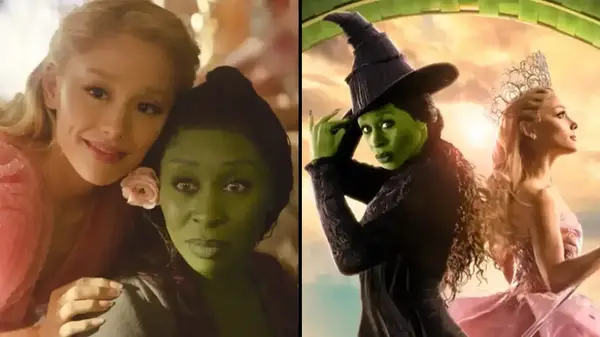Wicked fans have been left stunned after discovering the meaning of the name ‘Elphaba.’
The name Elphaba, the iconic character from Wicked, has long intrigued fans of the beloved Broadway musical, and with the movie‘s release, it’s back in the public eye.
For many, it’s simply the name of the misunderstood Wicked Witch of the West.
But what if we told you that there’s a deeper meaning behind this unusual name?

With the upcoming release of the Wicked movie, it’s crucial to acknowledge that the original novel contains dark and unsettling themes that may be distressing for many readers.
Gregory Maguire’s 1995 book, ‘Wicked: The Life and Times of the Wicked Witch of the West,’ reimagines ‘The Wizard of Oz’ from the villain’s perspective, earning a Nebula Award nomination and inspiring the Tony-winning Broadway musical in 2003.
While the musical is family-friendly, the novel dives into far grittier territory, exploring themes like misogyny, racism, transphobia, and graphic sexual content, making it unsuitable for younger audiences or sensitive readers.
Though set in a fictional world, Wicked mirrors real-world issues, portraying systemic prejudice and discrimination.
From the early chapters, Ozians face deeply ingrained misogyny and racism.
Marginalized groups like the Vinkus people, sentient animals, and women face segregation and discrimination, while comments about Elphaba often carry transphobic and queerphobic undertones.
These themes are evident not just in character interactions but also in Maguire’s writing style, which has been criticized for reinforcing stereotypes, particularly regarding the Quadling and Vinkus communities.
As one reviewer on Storygraph observed, female characters in the novel are often one-dimensional and unsympathetic, contrasting with the relatively nuanced portrayal of male characters.
Readers may find these elements challenging and must decide individually how they feel about the story.

In stark contrast to the Broadway adaptation, which is appropriate for all ages, the novel includes explicit sexual scenes and deeply unsettling content.
For example, the Clock of the Time Dragon stages highly inappropriate performances, including incestuous acts, and characters like Boq visit clubs featuring BDSM and interspecies encounters.
These graphic descriptions make it clear that Wicked was not intended for a young audience, as the adult themes are pervasive and disturbing.
The story of Elphaba’s conception adds another layer of discomfort.
Her mother, Melena, reveals that Elphaba’s green skin is the result of a non-consensual encounter with a man who drugged and raped her. This man is later revealed to be the Wizard.
The scene, described in stark detail, adds nothing significant to the story beyond explaining Elphaba’s skin color and further cementing the Wizard’s villainy, which had already been established through other actions.
Melena’s relationship with Elphaba is fraught with resentment and hostility.
Early in the book, Melena casually entertains thoughts of drowning her infant daughter, even suggesting this plan multiple times to her Nanny.
The repeated mentions of infanticide, along with Melena’s neglect and abusive behavior, are deeply disturbing and may alienate readers.
But there’s another element of the book that has left fans of the musical shocked, too – the origins of Elphaba’s name.

The fascinating origin behind Elphaba’s name is a clever nod to the author of the original Wizard of Oz, L. Frank Baum.
In Wicked, the name ‘Elphaba’ is a playful adaptation of Baum’s initials, ‘L. F. B.’
Macguire shared that he came up with the name by experimenting with different combinations.
He explained in an interview: “I invented the name by playing with the initials of the author, Lyman Frank Baum. I tried Lafaba, I tried Lafeyba. And then I tried Elphaba. As soon as I got Elphaba, I thought, oh, that’s it.”
Related Article: Wicked Star Cynthia Erivo Hits Back At Fans Who Edited Movie Poster: ‘Most Offensive Thing I Have Seen’
Related Article: People Just Realizing E.T. Has An Actual First Name That Most Of Us Missed



